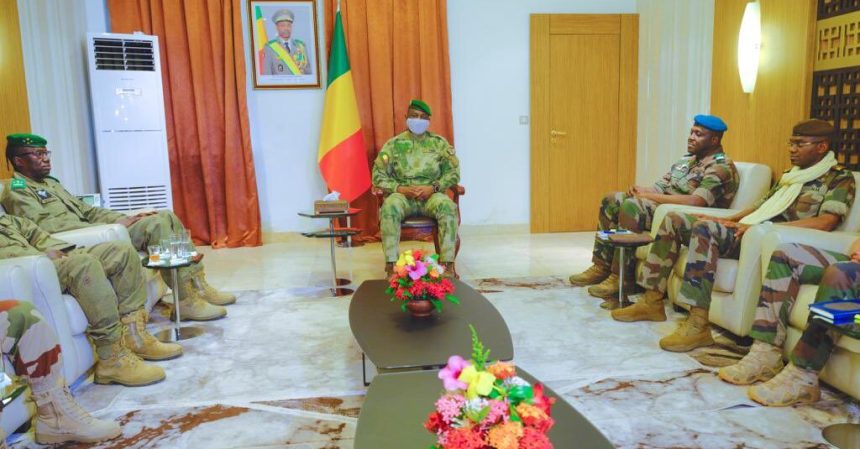A week after a military overthrow of Niger’s elected president, a coup leader and other officers flew to neighboring Mali on Wednesday to meet with its rulers, raising concerns that a key Western ally could grow closer to military leaders in Mali who partner with the Kremlin-backed Wagner private military company.
Gen. Salifou Modi, one of the putschists who removed President Mohamed Bazoum of Niger from power last week, was part of a delegation of military officials who visited Mali, according to a post on social media from the office of the president in Mali.
The Wagner group has about 1,500 troops in Mali, allied with the military regime there. Its founder, Yevgeny V. Prigozhin, has praised the coup in Niger and offered Wagner’s services to the new rulers, though it is unclear what operational control he still has over the group after his failed mutiny in Russia in June.
Niger had become in the past decade a reliable ally of France and the United States in the fight against Islamist insurgents. The military takeover of Niger has thrown that alliance into question, and the meeting in Mali is seen as an indication that the coup leaders in Niger are looking for support from an African nation backed by Russia.
There was no public indication whether General Modi met with Wagner operatives in Mali. However, the meeting on Tuesday was attended by Mali’s defense minister, who has been sanctioned by the United States for facilitating Wagner’s involvement in Mali.
“It’s public knowledge that the Malian junta is linked to Wagner, they are protected by Wagner, they replace any Western troops with Wagner,” Kiari Liman-Tinguiri, Niger’s ambassador to the United States, said in an interview on Wednesday.
In a brief address on Malian television, General Modi praised the “very good relationship” between Mali and Niger on security issues. General Modi was scheduled to travel to Burkina Faso next, where military leaders have moved closer to Russia in recent months.
Mr. Bazoum was still locked up in his private residence as of Wednesday, a week after soldiers led by General Tchiani detained him. He has not announced his resignation, and world leaders have called for his immediate release.
More than a dozen West African defense chiefs convened in Nigeria on Wednesday to discuss their response to the takeover in Niger. Their nations’ organization, the Economic Community of West African States, or ECOWAS, has threatened military action against the coup leaders if Mr. Bazoum isn’t reinstated by next Monday.
Niger’s neighbors to the west, Burkina Faso and Mali, both ruled by military juntas, said they would consider any military intervention against Niger as an act of war against them. That has raised fears of a broad regional conflict, though analysts say it is unlikely in the short term.
Mr. Liman-Tinguiri, the Nigerien ambassador, said that leaving Niger in the hands of military leaders represented a bigger threat to regional peace than an ECOWAS intervention. He noted that Islamist insurgents affiliated with Al Qaeda and the Islamic State controlled large swaths of Burkina Faso and Mali, and that Niger — where these militants are already active — could be next.
“There is a scenario of collapse of the region,” Mr. Liman-Tinguiri said. “If you give them a sanctuary of three countries,” he said of the jihadists’ factions, “You give them a base to take action against any others.”
The crisis is the biggest test in years for ECOWAS, and the first major diplomatic hurdle for its current head, Bola Ahmed Tinubu, the newly elected president of Nigeria. Nigeria has the largest military in West Africa and shares a nearly 1,000-mile border with Niger, to its north.
ECOWAS has imposed a slate of sanctions against Niger, which depends heavily on its neighbors for imports and cash. Nigeria supplies Niger with most of its electricity. As the bloc announced a freeze of energy and financial transactions, on Wednesday many in Niger found themselves without electricity and rushing to banks that faced widespread cash shortages.
Since 2021, there have been military coups in Mali, Burkina Faso and Guinea. All three countries were suspended by ECOWAS.
General Modi, who heads the Nigerien delegation visiting Mali, was the military chief of staff until he was removed from his duties by Mr. Bazoum in April, for reasons that weren’t made public. An adviser to Mr. Bazoum, speaking on condition of anonymity to protect his safety, said General Modi played a central role last week in rallying the military behind the coup.
Hundreds of Europeans continued to evacuate Niamey, the capital of Niger, on Wednesday. France said it had transported more than 730 residents on three flights, including about 500 French nationals. An Italian plane also took foreigners from the country, with some American passengers onboard.
A U.S. official said on Wednesday that a decision may soon be made to evacuate Americans. The Pentagon said it has suspended military cooperation with Niger, where there are about 1,100 American troops and drone bases used to carry out airstrikes against militants in Niger and neighboring countries.
Omar Hama Saley contributed reporting from Niamey, Niger, Declan Walsh from Nairobi, Kenya, and Helene Cooper from Washington.









